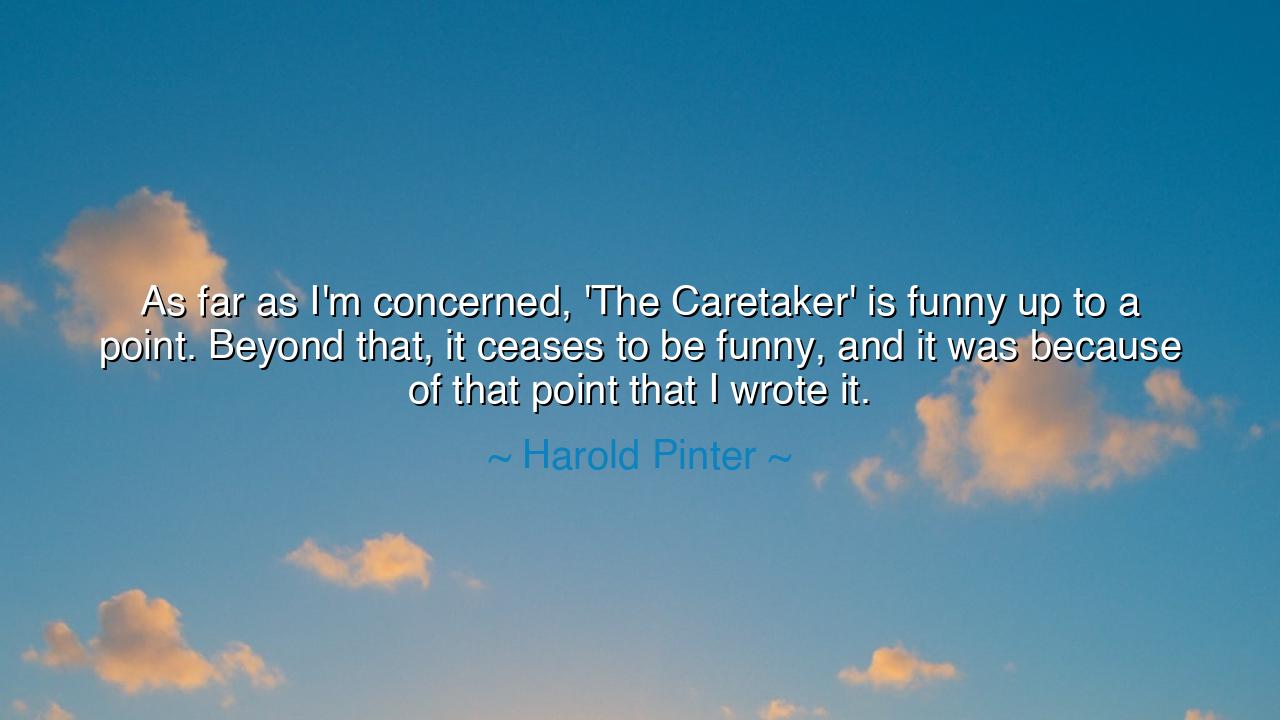
As far as I'm concerned, 'The Caretaker' is funny up to a point.
As far as I'm concerned, 'The Caretaker' is funny up to a point. Beyond that, it ceases to be funny, and it was because of that point that I wrote it.






“As far as I’m concerned, ‘The Caretaker’ is funny up to a point. Beyond that, it ceases to be funny, and it was because of that point that I wrote it.” Thus spoke Harold Pinter, the playwright of silence and shadow, whose words cut through laughter like a blade through silk. In this declaration lies a revelation of human truth—the kind that lives at the border between humor and despair. For Pinter, as for the great tragedians of old, laughter is not the end of the story but the beginning of understanding. He reminds us that comedy and cruelty, humor and horror, dwell side by side in the chambers of the human heart.
To say something is “funny up to a point” is to acknowledge that laughter has limits—that beyond a certain line, the smile falters, and the soul begins to see what lies beneath. Pinter’s The Caretaker, a tale of loneliness and power, begins with absurd exchanges, petty quarrels, and strange humor. But as the play unfolds, the comedy gives way to unease, and unease to pain. It is as though the laughter itself leads us toward revelation, then abandons us before the abyss. Pinter wrote from that borderline, the threshold where the human condition is laid bare—not through grand speeches, but through awkward pauses and quiet cruelty.
The ancients, too, understood this duality. In Aristophanes’ comedies, laughter often masked political despair; in Shakespeare’s fools, mirth cloaked wisdom. Yet Pinter went further—he stripped away ornament and left us with the silence that follows laughter. The point at which something “ceases to be funny” is the moment when the mask of humor cracks, and truth steps forward, raw and unadorned. That, Pinter tells us, is where his purpose begins: not in the jest itself, but in what it reveals. For beyond laughter lies recognition—the sobering knowledge of what it means to be human, fragile, and afraid.
Consider the story of Charlie Chaplin, the silent clown who made the world laugh through tears. In The Great Dictator, his comedy danced dangerously close to tragedy. He mocked tyranny with elegance and grace, but beneath the humor burned righteous anger. Like Pinter, Chaplin knew that the point where laughter dies is the place where conscience awakens. It is the threshold of empathy, where entertainment becomes art, and jest becomes judgment. Both men wielded humor as a mirror—to make us laugh, yes, but also to make us see.
This is the power of the funny up to a point—it disarms before it strikes. It invites the audience into comfort, only to lead them into confrontation. In The Caretaker, Pinter does not tell us what to feel; he lets the pauses, the silences, the unfinished sentences do the work. They are the ancient echoes of the Greek chorus, murmuring what the characters cannot say. The laughter that once filled the stage grows uneasy, then hollow. It is there, in that hollowness, that truth resides.
The wisdom of Pinter’s quote extends beyond the stage. Life itself is “funny up to a point.” We laugh to endure, to survive the absurdities of existence. Yet every joke carries its shadow. Every moment of levity, if examined deeply enough, reveals the ache beneath it—the longing for meaning, the fear of loss, the hunger for connection. Humor, in this light, is not denial but defense. It is the armor we wear until truth grows too heavy to ignore.
So, what lesson shall we draw, O listener of ages? It is this: do not fear the point where laughter ends. Seek it, for it is the border between illusion and understanding. Laugh, for laughter is holy, but listen also for the silence that follows—it speaks in a language older than words. The greatest art, the deepest love, the truest living—all dwell at this intersection, where joy and sorrow clasp hands.
Thus, as Harold Pinter teaches, the purpose of art—and perhaps of life—is not merely to amuse but to awaken. The laughter that fades reveals the truth that stays. Walk boldly toward that point, where the jest falters and meaning begins. For in that fragile moment, when the world stops laughing, the heart finally learns to see.






AAdministratorAdministrator
Welcome, honored guests. Please leave a comment, we will respond soon